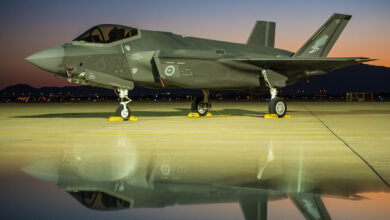The U.S. State Department approved the estimated $320.5 million sale to the NATO Support and Procurement Agency of precision guided munitions kits, the Defense Security Cooperation Agency said in a Monday, November 19 release.
The required certification notifying Congress was delivered on November 16.
NSPA is designated as the “Lead Nation” for the sale, which includes 11 NATO members – Belgium, Czech Republic, Denmark, Greece, Hungary, Italy, Norway, Poland, Portugal, Spain and the United Kingdom – and one NATO “Partnership for Peace” nation, Finland.
The proposed sale “supports the foreign policy and national security of the United States by increasing the flexibility” of the 13 states to “contribute to overseas contingency operations,” the DSCA release said, adding that it would increase the quantity of precision-guided munitions within NATO and allow for transfer in support of national and NATO requirements.
The sale comprises various Joint Direct Attack Munition guidance kits for 500-lb, 1,000-lb and 2,000-lb bombs, Paveway II guidance kits for 500-lb bombs, along with programmable fuzes, proximity sensors, as well as repair and return services, transportation, engineering services, and other support services.
The Joint Direct Attack Munition is a guidance kit that converts unguided “dumb” gravity bombs into accurate, guided “smart bombs.”
The bolt-on kit contains a GPS-aided inertial navigational system to improve the accuracy of general purpose bombs. Once released, the JDAM autonomously navigates to the designated coordinates.
The Paveway system uses laser-guidance.
The prime contractors are Boeing and Raytheon, but the principle contractor is yet to be determined.
NATO collective purchasing
The proposed sale is the second to be announced after a group of NATO member states authorized the NSPA to make purchases of precision guided munitions on their behalf in 2016. That cooperation effort was launched in 2014 at the NATO Summit in Wales.
The initial purchase, approved by the State Department in August 2016, was for similar materiel and was valued at $231 million. It was the first collective purchase under the U.S. Foreign Military Sales program.
Hungary, Italy, Poland and Finland have been added since.
Jane’s reported a senior U.S. official as telling a closed gathering of government and industry officials in December 2016 that “there could be additional types of weaponry eligible as follow-on joint purchase agreements.”
The official said the European nations viewed the purchase as “a test case for the flexibility of transfer” from the U.S. to a group of nations instead of individual bilateral agreements.
“They bumped straight into the U.S. restrictions on third-country transfers since each arrangement is bilateral with its own set of conditions. They had to request their smart-bombs directly from the US military, which affected its own stocks in a negative way,” the official said.
In August, the NSPA received the first lot of precision guided munitions, destined for Belgium and Denmark and valued at around $20 million, and the second and third rounds of acquisition were already underway
“This initiative seeks to address a problem that NATO first encountered during the Libya Operation: when some Allies ran out of their stockpiles of munitions, they found it incredibly difficult to use those of other air forces. We realized that we needed a new, flexible approach to the provision of air-to-ground precision-guided munitions,” NATO Deputy Secretary General Rose Gottemoeller said in August.












